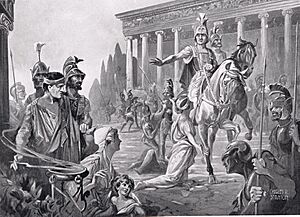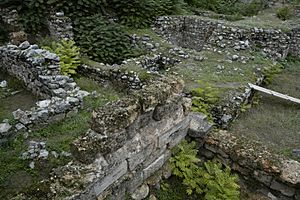Battle of Thebes facts for kids
Quick facts for kids Battle of Thebes |
|||||||
|---|---|---|---|---|---|---|---|
 Alexander at the sack of Thebes by Charles R. Stanton (illustration from Hutchinsons History of the Nations, 1915) |
|||||||
|
|||||||
| Belligerents | |||||||
| Macedon other Greek allies |
Thebes | ||||||
| Commanders and leaders | |||||||
| Alexander the Great | Phoenix † Prothytes † |
||||||
| Strength | |||||||
|
33,000
|
15,000 | ||||||
| Casualties and losses | |||||||
| unknown | 6,000 killed 30,000 captured |
||||||
The Battle of Thebes took place in 335 BC. It was a fight between Alexander the Great and the Greek city-state of Thebes. The battle happened both outside and inside the city of Thebes, which is in a region called Boeotia.
Alexander had recently become the leader, or hegemon, of the League of Corinth. This was a group of Greek city-states under Macedonian control. He had gone north to stop rebellions in Illyria and Thrace. This meant he had to take many soldiers away from Macedonia. These soldiers usually kept the southern Greek city-states under control.
Contents
Why Thebes Rebelled Against Alexander
Thebes had been under Macedonian control since the Battle of Chaeronea. This battle had caused Thebes to lose its power as the most important city-state in Southern Greece. The Thebans did not like this. They also did not like being forced to join the League of Corinth. Alexander's father, Philip II of Macedon, had made them join.
Alexander was planning a big trip to fight against Persia. He wanted to get revenge for past Persian attacks on Greece. Even though Macedonia had once been a vassal state (a state controlled by another) of Persia, Alexander wanted to fight them. Because of this plan, the Persian King Darius III started giving money to Greek city-states. He hoped they would rebel against Alexander. He also sent his general Memnon of Rhodes to fight Macedonian troops already in Ionia.
News about Alexander had not reached southern Greece for a while. He had been busy with a fight called the siege of Pelium. A rumor spread that he had died during this siege. Demosthenes, an important politician from Athens, even brought a man who claimed to have been there. This man said Alexander was dead. Alexander had indeed been hurt during the siege, so the rumor seemed believable.
When Theban exiles in Athens heard Alexander was supposedly dead, they rushed back to Thebes. They wanted to start a rebellion against Macedonian rule. Thebans received money from the Persian king. Demosthenes also got Persian money and used it to buy weapons for the Thebans. The Athenian Ecclesia, which was their assembly, made a deal to defend Thebes against Macedonia.
The Cadmaea was a citadel (a strong fortress) on a hill in Thebes. It had a Macedonian army stationed there. The Thebans wanted to attack this fortress. They killed two Macedonian officers who were in the city. Then, they declared that they were independent from Macedonia.
Alexander's Swift March to Thebes
When Alexander heard about the Theban revolt, he was very worried. He had only gained the loyalty of the city-states at the start of his rule because his army was there. Now, there was no large army in southern Greece. Many cities were trying to break free from Macedonian control.
So, Alexander quickly marched south. He reached Thessaly in just seven days. By the end of the next week, he was in Boeotia. He had marched over 300 miles in two weeks! The Thebans were shocked to see him so close. They didn't even believe it was Alexander. They thought it was Antipater, one of his generals. Alexander had passed through the famous pass of Thermopylae without any city-states knowing.
The Siege of Thebes Begins
When Alexander arrived in Boeotia, many cities immediately stopped supporting the idea of Greek independence. They left Thebes to fight alone. Athens, led by Demosthenes, who always opposed Philip, again spoke out against Macedonia. They voted to support Thebes and sent weapons. But Athens did not send its soldiers. They decided to wait and see what would happen. The Spartans sent troops as far as the Isthmus of Corinth, but they also avoided fighting Alexander.
Even though they were alone, the Theban assembly met. They bravely decided to go to war. They faced Alexander's large army of experienced soldiers at their city gates. Alexander did not want to destroy the city. He approached slowly and set up his camp far from the walls. He hoped to make the Thebans give up. He offered them easy terms: they only had to hand over Phoenix and Prothytes, the leaders of the rebellion. Everyone else would be safe. But the Thebans refused. They demanded that Alexander hand over Antipater and Philotas to them instead.
The Cadmaea citadel in Thebes held Alexander's soldiers, led by Philotas. They had made the citadel stronger against the Thebans in the outer city. The Thebans had built defenses around the citadel. They also built fences, called palisades, around their city.
After three days of getting ready, Alexander divided his army into three parts. The first part attacked the palisades. The second part formed a line against the Theban foot soldiers. The third part was kept in reserve. They would fill gaps and take advantage of good opportunities.
To defend themselves, the Thebans freed their slaves. They placed them to face the Macedonian attack on the wall. The Theban cavalry (soldiers on horseback) were placed inside the palisades. The Thebans prepared to fight until the very end. They put their women and children in the city's temples for safety.
The Fall of Thebes
During the attack, the Thebans fought very hard. They were afraid for their homes, wives, and children. The battle was uncertain for some time. But Alexander's reserve troops changed the fight. Alexander noticed that the Theban guards had left one of their gates unguarded. He quickly sent Perdiccas' soldiers to take the gate and enter the city. At this point, the Thebans realized they had lost the walls. They retreated into the city. But Philotas's soldiers then broke out of the citadel. They surrounded the Thebans, and the battle ended.
The Destruction of Thebes
Alexander punished the Thebans very harshly for their rebellion. Thirty thousand people were sold into slavery. Six thousand were killed in the final fighting. The city was burned to the ground. Only the temples, the Cadmaea citadel, and the house of the poet Pindar were saved. Alexander saved Pindar's house because he was grateful for Pindar's poems praising Alexander's ancestor, Alexander I of Macedon.
What Happened After the Battle?
The destruction of Thebes shocked all of Greece. It caused anti-Macedonian leaders to be punished. It also stopped other revolts before they could even begin. Alexander then turned his attention to the great city of Athens. Athens had stayed out of the direct fighting. But it was thought to have encouraged Thebes and other Greek city-states to rebel. So, Alexander demanded that Athens hand over ten of its leaders who opposed Macedonia. However, thanks to the efforts of an Athenian named Demades, Alexander was persuaded to be kind. He chose to forgive and forget.
 | Stephanie Wilson |
 | Charles Bolden |
 | Ronald McNair |
 | Frederick D. Gregory |


